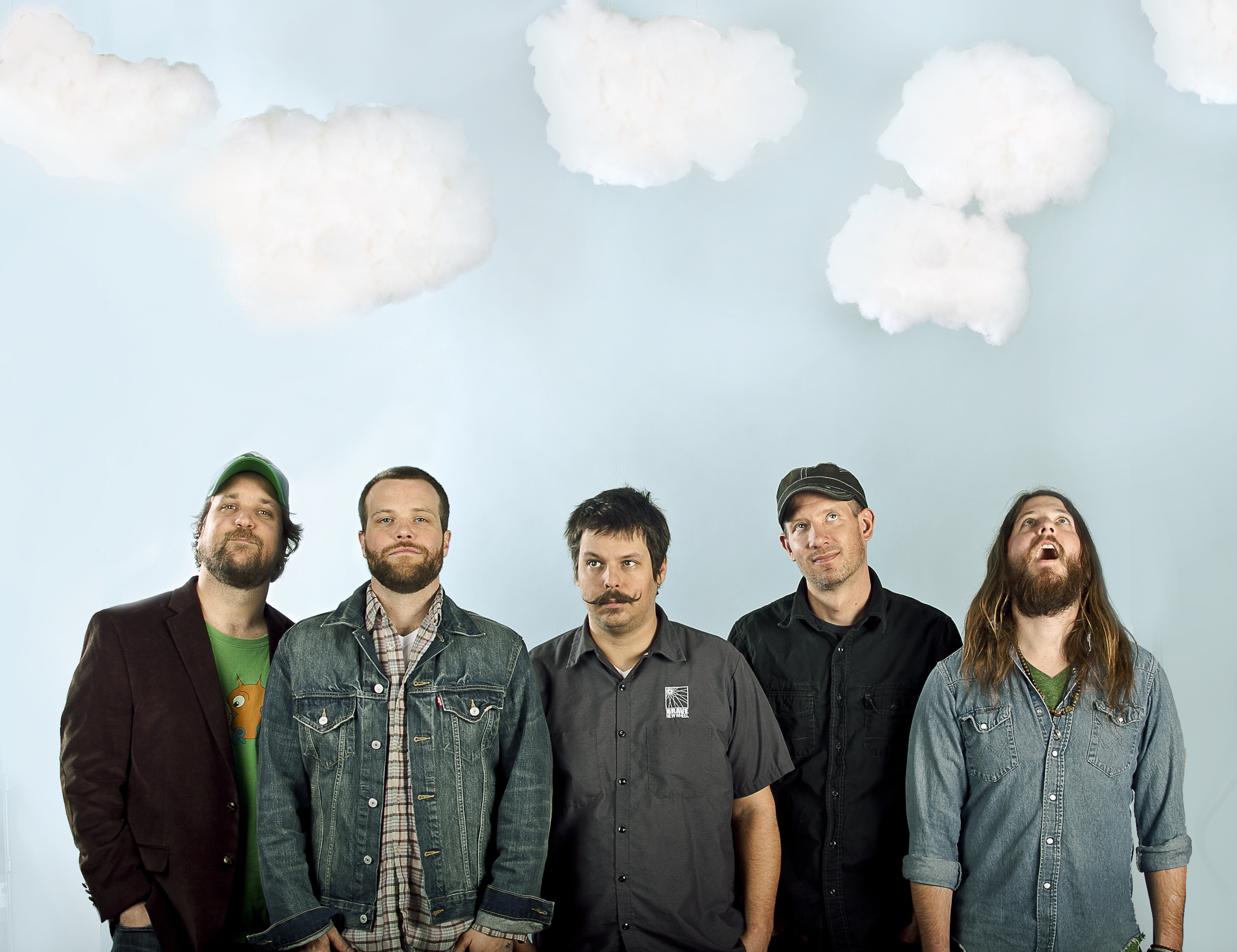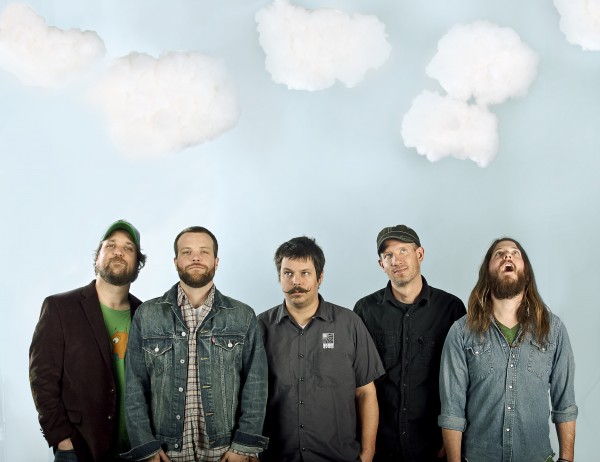
09 Nov Sheridan Opera House: Greensky Bluegrass, 2 Nights
Telluride’s Sheridan Arts Foundation presents two nights of Greensky Bluegrass live at the historic Sheridan Opera House. Shows, Monday & Tuesday, Nov. 16-17, 2015. Opening support Tom Hamilton’s American Babies. Tickets here.
Greensky Bluegrass is decidedly not your granddaddy’s bluegrass band: the new-timey group was formed in 2000 in Kalamazoo, Michigan, a healthy distance from the Blue Ridge mountains. The current formation is Anders Beck (dobro), Michael Arlen Bont (banjo), Dave Bruzza (guitar), Mike Devol (upright bass), and Paul Hoffman (mandolin).
“There’s this great duality to our band,” reflects mandolinist, vocalist, and songwriter Hoffman. “We exist in a few different places at once: we’re a bluegrass band and a rock band; we’re song-driven and interested in extended improvisation.”
“We play acoustic instruments,” adds Beck, “but we put on a rock’n’roll show. We play in bigger clubs and theaters, there’s a killer light show, and we’re as loud as your favorite rock band. It’s not easy to make five acoustic instruments sound like this. It’s something we’ve spent years working on.”
From these seemingly irreconcilable elements, the five members of Greensky Bluegrass forged a defiant, powerful sound that, while rooted in classic string band Americana, extends outwards with a fearless, exploratory zeal. The tension and release between these components – tradition and innovation, prearranged songs and improvisation, acoustic tones and electric volume – is what makes them so thrillingly dynamic, in concert and on record.
“In theory,” Hoffman explains, “Greensky is the complete opposite of bluegrass. So, by definition, we are contrasting everything that isn’t bluegrass with everything that is.”
The fact that their sound is so seamless, so organic, is testament to Greensky’s enduring vision and tireless dedication. Since their first rumblings at the start of the millennium, the group has emerged as relentless road warriors, creating a captivating live show and a knack for evocative, disarming songcraft.
Greensky’s fifth studio album, If Sorrows Swim, released in 2015, is their most riveting yet, balancing gripping songs (by Hoffman and Bruzza) and remarkably thoughtful, tight arrangements with an instrumental fluidity born of countless hours playing together, on stage and off.
From their unlikely base of Kalamazoo (home of the original Gibson Mandolin-Guitar factory), Greensky arrived at their unique take on bluegrass by working from the outside in.
“I found bluegrass through the back door,” Beck says, “through the Jerry Garcia route. That’s how I got to listening to Bill Monroe and Earl Scruggs. It’s really interesting how many people in our generation got into acoustic music through that channel.”
Approaching their instruments from an open-ended, rock perspective gives the group the freedom to create their own rules.
“We were always coming at bluegrass backwards,” Hoffman says. “We were better musicians than we were bluegrass musicians. I mean, I didn’t buy a mandolin until I was 18. Dave didn’t start playing acoustic guitar until he was 18. Bont got a banjo when he was 20. We discovered that, when it came to learning these instruments, we preferred to do so by improvising and writing our own songs, instead playing standard material and fiddle tunes.”
Greensky Bluegrass’s roots lay in the friendship of Bruzza and Bont. While nurturing a nascent interest in acoustic music, they were joined by Hoffman. The trio shredded intently, playing informally in living rooms and at open mics for years before setting out as a band. Devol, a classically trained cellist, was added in the fall of 2004.
In 2006, Greensky Bluegrass won the coveted band contest at Colorado’s forward-thinking Telluride Bluegrass Festival. At that point, the members dedicated themselves to Greensky full-time and began widening their touring radius. They also became Telluride regulars.
In 2007, dobroist Beck came aboard. From the sidelines, he was quick to pinpoint the band’s appeal.
“It was all about the songs,” he says. “You can be the best pickers in the world or the most educated musicians, but, all in all, the things that connect with people are songs, lyrics, and melodies. That was the real kicker.”
By playing up to 175 shows a year, mostly in rock clubs and more open-minded festivals like Telluride, Austin City Limits, Bonnaroo, and the New Orleans Jazz and Heritage Festival, Greensky Bluegrass became a word-of-mouth underground sensation, cultivating a devoted legion of fans entranced both by the band’s improvisational acumen and the quality of their songwriting. Then and now, despite their wide-ranging musical interests, Greensky continues to work within the structure of a classic five-man stringband.
“The cool thing about a bluegrass band or, really, any drummerless band,” Hoffman explains, “is that it’s like acoustic chamber music: challenging, exciting, and fun to play.”
“While there are potential limitations because of our instrumentation,” Beck adds, “a really big part of what is Greensky Bluegrass is about is to essentially ignore those limitations.”
The depth and sophistication of the band’s interplay is showcased throughout If Sorrowss Swim, across a program of stirring, resonant original songs. Recorded over 10 days, the album was tracked to two-inch tape.
“The decision to use tape over digital recording is basically the decision to use less,” Hoffman explains. “It’s not about everything being perfect, it’s about capturing a moment in time.”
The album mixes previously unrecorded, road-tested concert staples with new material carefully honed with the sort of razor’s-edge focus the recording studio inspires.
If Sorrows Swim opens with “Windshield,” a haunting rumination that slowly builds in emotional and musical intensity around an insistent pulse from the bass. The desperation in Hoffman’s increasingly anguished vocal is slowly surrounded by churning rhythm guitar and incessant banjo before the tension is dispersed by a plaintive dobro solo. A brooding cello line deep in the mix adds an ominous undercurrent, and underpins the group’s swirling counterpoint as the track fades.
The album’s title derives from “Burn Them,” a minor key reflection set to a more straight-ahead, driving bluegrass rhythm.
“There was something on This American Life,” Hoffman recalls. “Someone was talking about just how upset and sad they were. They were drinking a lot, but they just couldn’t drink that pain away. When I heard that, I thought to myself, ‘What if sorrows swim?’ I couldn’t get that thought out of my mind.”
Tightly orchestrated, Greensky’s performance is marked by ingenious touches. The transitions between the guitar and mandolin solos are delineated by a quick unison passage played by both instruments and Bont contributes an especially nimble, melodic break.
Greensky Bluegrass takes the Sheridan Opera House by storm on a two-night run Nov. 16 and 17. The opening act is Tom Hamilton’s American Babies.
Tickets are $25 GA on the floor and $35 reserved in the balcony in advance or $30 and $40 the day of the show.
To purchase tickets visit SheridanOperaHouse.com or call 970.728.6363 ext. 5.
For a preview of the show, watch here:
The Sheridan Arts Foundation was founded in 1991 as a 501(c) (3) non-profit organization to preserve the historic Sheridan Opera House as an arts and cultural resource for the Telluride community, to bring quality arts and cultural events to Telluride and to provide local and national youth with access and exposure to the arts through education. The Sheridan Arts Foundation is sponsored in part by grants from the Telluride Foundation, CCAASE, & Just For Kids.



Sorry, the comment form is closed at this time.